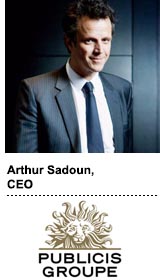
Publicis Groupe’s $4.4 billion purchase of email marketing and data company Epsilon on Sunday comes down to three words: first-party data.
“What is really important for our clients is to build their first-party data,” said Publicis Groupe CEO Arthur Sadoun on an investor call Monday. “If not, they will be killed by direct to consumer brands or Amazon.”
Publicis wants to convince clients it can help them transform their business practices, in part by delivering personalized experiences at scale. And owning first-party data is key to that agenda. It’s a similar reason to why IPG shelled out $2.3 billion for Acxiom in July 2018, and why Dentsu Aegis Network bought Merkle for $436 million in 2016.
“This gives Publicis access to a proprietary set of data that Epsilon has generated through all of its marketing activity over the years and identity resolution capabilities,” said Jay Pattisall, principal analyst at Forrester.
Epsilon’s online and offline data covers 250 million US consumers and 173 billion transactions, and the company can onboard, clean and structure clients’ first-party data. It can also merge that data with its own unique ID and use AI to manage reach and frequency across the consumer journey. Publicis wants to build vertical-specific data stacks for clients, which Epsilon has already done in the automotive space.
Epsilon also employs 3,700 data scientists and experts which can help Publicis clients navigate an increasingly privacy-centric marketing landscape, Sadoun said.
“[Clients] need technology to manage their first-party data in a totally compliant and transparent way,” he said. “Epsilon puts us where our clients need us to be to future-proof their model in challenging conditions.”
Publicis plans to operate Epsilon across its business units to power creativity, media and business transformation. Epsilon CEO Bryan Kennedy will continue leading the group, reporting directly to Sadoun.
The work ahead
For Publicis, integrating Epsilon could pose a challenge.
The company has a mix of platforms across email marketing, CRM, ad tech (Conversant) and affiliate marketing (Commission Junction), as well as an agency-like services arm and a data marketplace. It’s unclear how much work Publicis, which has gone through multiple major reorgs in the past few years, will have to do within the Epsilon stack before it can offer its services coherently to clients.
“There’s likely some overlap across those pieces,” Pattisall said.
Some investors on the call were concerned about Publicis’ track record with major acquisitions. The holding company is still struggling to fully integrate Sapient, the consulting firm it bought for $3.7 billion in 2014 and wrote down by $1.5 billion three years later.
Others wondered why Publicis paid so much for Epsilon, as clients slash marketing budgets and the holding companies struggle to grow. Publicis also reported Q1 earnings Monday with organic growth down 1.8% to $2.4 billion due to client attrition.
“We are not happy with our growth,” Sadoun said. “This should be our priority. We were not ready to do anything that will not create value for shareholders in 2020.”
But Sadoun reassured investors that Epsilon, which brought in $2 billion in revenue last year, “is a perfect strategic fit for Publicis.” He sees opportunities to cross-sell into existing Epsilon clients and get Publicis’ current clients to spend more on new data-related activities. Publicis expects the acquisition to be fully accretive on headline EPS and cash flow by 2020, he said.
“The shift that’s happening from brand creative strategy to activation is where we want to play,” he said. “For Epsilon to activate from the Conversant platform is a very strong proposition for our clients.”
Publicis will also expand Epsilon, which brings in 97% of its revenue in the United States, internationally, with plans to achieve 5% to 10% growth in the next year and a half. It will also look to generate roughly $68 million in cash savings by rationalizing both companies’ respective data platforms, IT and real estate.
“I know this is an unexpected move, but it is a one-time opportunity,” he said. “Epsilon is the sweet spot that connects marketing and business transformation. It will arm Publicis to face marketing realities in today’s data-led world.”
This post was syndicated from Ad Exchanger.


More Stories
Casie Mason Joins WFIE in Evansville as AM Anchor
Here’s How Various News Outlets Will Cover Pope Francis’ Funeral
What Media Rights Deals Mean to the Future of Women’s Sports